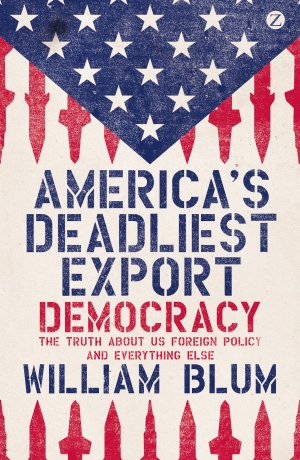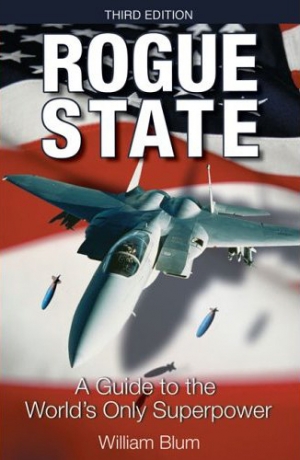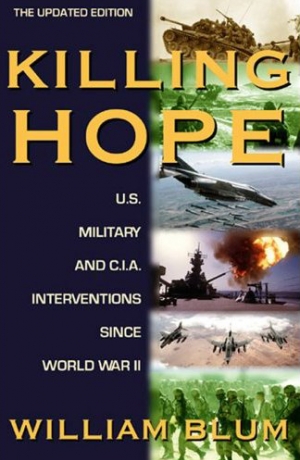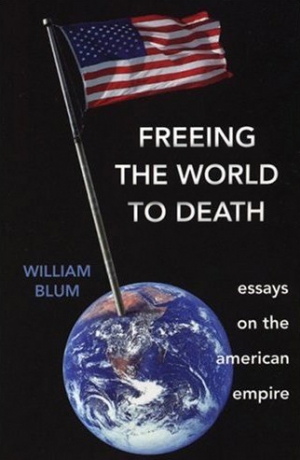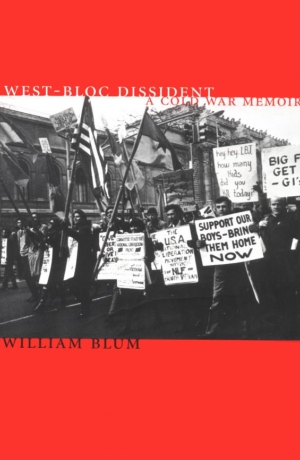The Anti-Empire Report #132
By William Blum – Published September 16th, 2014
Ukraine and neo-Nazis
Ever since serious protest broke out in Ukraine in February the Western mainstream media, particularly in the United States, has seriously downplayed the fact that the usual suspects – the US/European Union/NATO triumvirate – have been on the same side as the neo-Nazis. In the US it’s been virtually unmentionable. I’m sure that a poll taken in the United States on this issue would reveal near universal ignorance of the numerous neo-Nazi actions, including publicly calling for death to “Russians, Communists and Jews”. But in the past week the dirty little secret has somehow poked its head out from behind the curtain a bit.
On September 9 NBCnews.com reported that “German TV shows Nazi symbols on helmets of Ukraine soldiers”. The German station showed pictures of a soldier wearing a combat helmet with the “SS runes” of Hitler’s infamous black-uniformed elite corps. (Runes are the letters of an alphabet used by ancient Germanic peoples.) A second soldier was shown with a swastika on his helmet. 1
On the 13th, the Washington Post showed a photo of the sleeping quarter of a member of the Azov Battalion, one of the Ukrainian paramilitary units fighting the pro-Russian separatists. On the wall above the bed is a large swastika. Not to worry, the Post quoted the platoon leader stating that the soldiers embrace symbols and espouse extremist notions as part of some kind of “romantic” idea.
Yet, it is Russian president Vladimir Putin who is compared to Adolf Hitler by everyone from Prince Charles to Princess Hillary because of the incorporation of Crimea as part of Russia. On this question Putin has stated:
The Crimean authorities have relied on the well-known Kosovo precedent, a precedent our Western partners created themselves, with their own hands, so to speak. In a situation absolutely similar to the Crimean one, they deemed Kosovo’s secession from Serbia to be legitimate, arguing everywhere that no permission from the country’s central authorities was required for the unilateral declaration of independence. The UN’s international court, based on Paragraph 2 of Article 1 of the UN Charter, agreed with that, and in its decision of 22 July 2010 noted the following, and I quote verbatim: No general prohibition may be inferred from the practice of the Security Council with regard to unilateral declarations of independence. 2
Putin as Hitler is dwarfed by the stories of Putin as invader (Vlad the Impaler?). For months the Western media has been beating the drums about Russia having (actually) invaded Ukraine. I recommend reading: “How Can You Tell Whether Russia has Invaded Ukraine?” by Dmitry Orlov 3
And keep in mind the NATO encirclement of Russia. Imagine Russia setting up military bases in Canada and Mexico, from the Atlantic to the Pacific. Remember what a Soviet base in Cuba led to.
Has the United States ever set a bad example?
Ever since that fateful day of September 11, 2001, the primary public relations goal of the United States has been to discredit the idea that somehow America had it coming because of its numerous political and military acts of aggression. Here’s everyone’s favorite hero, George W. Bush, speaking a month after 9-11:
“How do I respond when I see that in some Islamic countries there is vitriolic hatred for America? I’ll tell you how I respond: I’m amazed. I’m amazed that there’s such misunderstanding of what our country is about that people would hate us. I am – like most Americans, I just can’t believe it because I know how good we are.” 4
Thank you, George. Now take your pills.
I and other historians of US foreign policy have documented at length the statements of anti-American terrorists who have made it explicitly clear that their actions were in retaliation for Washington’s decades of international abominations. 5 But American officials and media routinely ignore this evidence and cling to the party line that terrorists are simply cruel and crazed by religion; which many of them indeed are, but that doesn’t change the political and historical facts.
This American mindset appears to be alive and well. At least four hostages held in Syria recently by Islamic State militants, including US journalist James Foley, were waterboarded during their captivity. The Washington Post quoted a US official: “ISIL is a group that routinely crucifies and beheads people. To suggest that there is any correlation between ISIL’s brutality and past U.S. actions is ridiculous and feeds into their twisted propaganda.”
The Post, however, may have actually evolved a bit, adding that the “Islamic State militants … appeared to model the technique on the CIA’s use of waterboarding to interrogate suspected terrorists after the Sept. 11, 2001, attacks.” 6
Talk given by William Blum at a Teach-In on US Foreign Policy, American University, Washington, DC, September 6, 2014
Each of you I’m sure has met many people who support American foreign policy, with whom you’ve argued and argued. You point out one horror after another, from Vietnam to Iraq. From god-awful bombings and invasions to violations of international law and torture. And nothing helps. Nothing moves this person.
Now why is that? Are these people just stupid? I think a better answer is that they have certain preconceptions. Consciously or unconsciously, they have certain basic beliefs about the United States and its foreign policy, and if you don’t deal with these basic beliefs you may as well be talking to a stone wall.
The most basic of these basic beliefs, I think, is a deeply-held conviction that no matter what the United States does abroad, no matter how bad it may look, no matter what horror may result, the government of the United States means well. American leaders may make mistakes, they may blunder, they may lie, they may even on the odd occasion cause more harm than good, but they do mean well. Their intentions are always honorable, even noble. Of that the great majority of Americans are certain.
Frances Fitzgerald, in her famous study of American school textbooks, summarized the message of these books: “The United States has been a kind of Salvation Army to the rest of the world: throughout history it had done little but dispense benefits to poor, ignorant, and diseased countries. The U.S. always acted in a disinterested fashion, always from the highest of motives; it gave, never took.”
And Americans genuinely wonder why the rest of the world can’t see how benevolent and self-sacrificing America has been. Even many people who take part in the anti-war movement have a hard time shaking off some of this mindset; they march to spur America – the America they love and worship and trust – they march to spur this noble America back onto its path of goodness.
Many of the citizens fall for US government propaganda justifying its military actions as often and as naively as Charlie Brown falling for Lucy’s football.
The American people are very much like the children of a Mafia boss who do not know what their father does for a living, and don’t want to know, but then wonder why someone just threw a firebomb through the living room window.
This basic belief in America’s good intentions is often linked to “American exceptionalism”. Let’s look at how exceptional US foreign policy has been. Since the end of World War 2, the United States has:
- Attempted to overthrow more than 50 foreign governments, most of which were democratically-elected.
- Dropped bombs on the people of more than 30 countries.
- Attempted to assassinate more than 50 foreign leaders.
- Attempted to suppress a populist or nationalist movement in 20 countries.
- Grossly interfered in democratic elections in at least 30 countries.
- Led the world in torture; not only the torture performed directly by Americans upon foreigners, but providing torture equipment, torture manuals, lists of people to be tortured, and in-person guidance by American teachers, especially in Latin America.
This is indeed exceptional. No other country in all of history comes anywhere close to such a record.
So the next time you’re up against a stone wall … ask the person what the United States would have to do in its foreign policy to lose his support. What for this person would finally be TOO MUCH. If the person mentions something really bad, chances are the United States has already done it, perhaps repeatedly.
Keep in mind that our precious homeland, above all, seeks to dominate the world. For economic reasons, nationalistic reasons, ideological, Christian, and for other reasons, world hegemony has long been America’s bottom line. And let’s not forget the powerful Executive Branch officials whose salaries, promotions, agency budgets and future well-paying private sector jobs depend upon perpetual war. These leaders are not especially concerned about the consequences for the world of their wars. They’re not necessarily bad people; but they’re amoral, like a sociopath is.
Take the Middle East and South Asia. The people in those areas have suffered horribly because of Islamic fundamentalism. What they desperately need are secular governments, which have respect for different religions. And such governments were actually instituted in the recent past. But what has been the fate of those governments?
Well, in the late 1970s through much of the 1980s, Afghanistan had a secular government that was relatively progressive, with full rights for women, which is hard to believe, isn’t it? But even a Pentagon report of the time testified to the actuality of women’s rights in Afghanistan. And what happened to that government? The United States overthrew it, allowing the Taliban to come to power. So keep that in mind the next time you hear an American official say that we have to remain in Afghanistan for the sake of women’s rights.
After Afghanistan came Iraq, another secular society, under Saddam Hussein. And the United States overthrew that government as well, and now the country is overrun by crazed and bloody jihadists and fundamentalists of all kinds; and women who are not covered up are running a serious risk.
Next came Libya; again, a secular country, under Moammar Gaddafi, who, like Saddam Hussein, had a tyrant side to him but could in important ways be benevolent and do marvelous things for Libya and Africa. To name just one example, Libya had a high ranking on the United Nation’s Human Development Index. So, of course, the United States overthrew that government as well. In 2011, with the help of NATO we bombed the people of Libya almost every day for more than six months. And, once again, this led to messianic jihadists having a field day. How it will all turn out for the people of Libya, only God knows, or perhaps Allah.
And for the past three years, the United States has been doing its best to overthrow the secular government of Syria. And guess what? Syria is now a playground and battleground for all manner of ultra militant fundamentalists, including everyone’s new favorite, IS, the Islamic State. The rise of IS owes a lot to what the US has done in Iraq, Libya, and Syria in recent years.
We can add to this marvelous list the case of the former Yugoslavia, another secular government that was overthrown by the United States, in the form of NATO, in 1999, giving rise to the creation of the largely-Muslim state of Kosovo, run by the Kosovo Liberation Army (KLA). The KLA was considered a terrorist organization by the US, the UK and France for years, with numerous reports of the KLA being armed and trained by al-Qaeda, in al-Qaeda camps in Pakistan, and even having members of al-Qaeda in KLA ranks fighting against the Serbs of Yugoslavia. Washington’s main concern was dealing a blow to Serbia, widely known as “the last communist government in Europe”.
The KLA became renowned for their torture, their trafficking in women, heroin, and human body parts; another charming client of the empire.
Someone looking down upon all this from outer space could be forgiven for thinking that the United States is an Islamic power doing its best to spread the word – Allah Akbar!
But what, you might wonder, did each of these overthrown governments have in common that made them a target of Washington’s wrath? The answer is that they could not easily be controlled by the empire; they refused to be client states; they were nationalistic; in a word, they were independent; a serious crime in the eyes of the empire.
So mention all this as well to our hypothetical supporter of US foreign policy and see whether he still believes that the United States means well. If he wonders how long it’s been this way, point out to him that it would be difficult to name a single brutal dictatorship of the second half of the 20th Century that was not supported by the United States; not only supported, but often put into power and kept in power against the wishes of the population. And in recent years as well, Washington has supported very repressive governments, such as Saudi Arabia, Honduras, Indonesia, Egypt, Colombia, Qatar, and Israel.
And what do American leaders think of their own record? Former Secretary of State Condoleezza Rice was probably speaking for the whole private club of our foreign-policy leadership when she wrote in 2000 that in the pursuit of its national security the United States no longer needed to be guided by “notions of international law and norms” or “institutions like the United Nations” because America was “on the right side of history.” 7
Let me remind you of Daniel Ellsberg’s conclusion about the US in Vietnam: “It wasn’t that we were on the wrong side; we were the wrong side.”
Well, far from being on the right side of history, we have in fact fought – I mean actually engaged in warfare – on the same side as al Qaeda and their offspring on several occasions, beginning with Afghanistan in the 1980s and 90s in support of the Islamic Moujahedeen, or Holy Warriors.
The US then gave military assistance, including bombing support, to Bosnia and Kosovo, both of which were being supported by al Qaeda in the Yugoslav conflicts of the early 1990s.
In Libya, in 2011, Washington and the Jihadists shared a common enemy, Gaddafi, and as mentioned, the US bombed the people of Libya for more than six months, allowing jihadists to take over parts of the country; and they’re now fighting for the remaining parts. These wartime allies showed their gratitude to Washington by assassinating the US ambassador and three other Americans, apparently CIA, in the city of Benghazi.
Then, for some years in the mid and late 2000s, the United States backed Islamic militants in the Caucasus region of Russia, an area that has seen more than its share of religious terror going back to the Chechnyan actions of the 1990s.
Finally, in Syria, in attempting to overthrow the Assad government, the US has fought on the same side as several varieties of Islamic militants. That makes six occasions of the US being wartime allies of jihadist forces.
I realize that I have fed you an awful lot of negativity about what America has done to the world, and maybe it’s been kind of hard for some of you to swallow. But my purpose has been to try to loosen the grip on your intellect and your emotions that you’ve been raised with – or to help you to help others to loosen that grip – the grip that assures you that your beloved America means well. US foreign policy will not make much sense to you as long as you believe that its intentions are noble; as long as you ignore the consistent pattern of seeking world domination, which is a national compulsion of very long standing, known previously under other names such as Manifest Destiny, the American Century, American exceptionalism, globalization, or, as Madeleine Albright put it, “the indispensable nation” … while others less kind have used the term “imperialist”.
In this context I can’t resist giving the example of Bill Clinton. While president, in 1995, he was moved to say: “Whatever we may think about the political decisions of the Vietnam era, the brave Americans who fought and died there had noble motives. They fought for the freedom and the independence of the Vietnamese people.” Yes, that’s really the way our leaders talk. But who knows what they really believe?
It is my hope that many of you who are not now activists against the empire and its wars will join the anti-war movement as I did in 1965 against the war in Vietnam. It’s what radicalized me and so many others. When I hear from people of a certain age about what began the process of losing their faith that the United States means well, it’s Vietnam that far and away is given as the main cause. I think that if the American powers-that-be had known in advance how their “Oh what a lovely war” was going to turn out they might not have made their mammoth historical blunder. Their invasion of Iraq in 2003 indicates that no Vietnam lesson had been learned at that point, but our continuing protest against war and threatened war in Afghanistan, Iran, Syria, and elsewhere may have – may have! – finally made a dent in the awful war mentality. I invite you all to join our movement. Thank you.
Notes
- NBC News, “German TV Shows Nazi Symbols on Helmets of Ukraine Soldiers”, September 6 2014
- BBC, March 18, 2014
- Information Clearinghouse, “How Can You Tell Whether Russia has Invaded Ukraine?”, September 1 2014
- Boston Globe, October 12, 2001
- See, for example, William Blum, Rogue State: A Guide to the World’s Only Superpower (2005), chapter 1
- Washington Post, August 28, 2014
- Foreign Affairs magazine (Council on Foreign Relations), January/February 2000
Any part of this report may be disseminated without permission, provided attribution to William Blum as author and a link to williamblum.org is provided.
